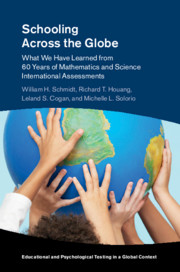 Schooling Across the Globe
Schooling Across the Globe Book contents
- Schooling Across the Globe
- Educational and Psychological Testing In a Global Context
- Schooling Across the Globe
- Copyright page
- Dedication
- Contents
- Figures
- Tables
- Series Editor’s Foreword
- Preface
- Acknowledgments
- Abbreviations
- Part I The Historical Development of Modern International Comparative Assessments
- Part II Conducting International Assessments in Mathematics and Science
- Chapter 3 Who Participates in International Assessments?
- Chapter 4 What Students Know
- Chapter 5 Relating Assessment to OTL
- Chapter 6 The Evolution of the Concept of Opportunity to Learn
- Chapter 7 The 1995 TIMSS Curriculum Analysis and Beyond
- Chapter 8 Characterizing Student Home and Family Background
- Part III The Lessons Learned from International Assessments of Mathematics and Science
- Book part
- References
- Index
Chapter 4 - What Students Know
From Items to Total Scaled Scores
from Part II - Conducting International Assessments in Mathematics and Science
Published online by Cambridge University Press: 12 November 2018
- Schooling Across the Globe
- Educational and Psychological Testing In a Global Context
- Schooling Across the Globe
- Copyright page
- Dedication
- Contents
- Figures
- Tables
- Series Editor’s Foreword
- Preface
- Acknowledgments
- Abbreviations
- Part I The Historical Development of Modern International Comparative Assessments
- Part II Conducting International Assessments in Mathematics and Science
- Chapter 3 Who Participates in International Assessments?
- Chapter 4 What Students Know
- Chapter 5 Relating Assessment to OTL
- Chapter 6 The Evolution of the Concept of Opportunity to Learn
- Chapter 7 The 1995 TIMSS Curriculum Analysis and Beyond
- Chapter 8 Characterizing Student Home and Family Background
- Part III The Lessons Learned from International Assessments of Mathematics and Science
- Book part
- References
- Index
Summary
- Type
- Chapter
- Information
- Schooling Across the GlobeWhat We Have Learned from 60 Years of Mathematics and Science International Assessments, pp. 65 - 85Publisher: Cambridge University PressPrint publication year: 2018


